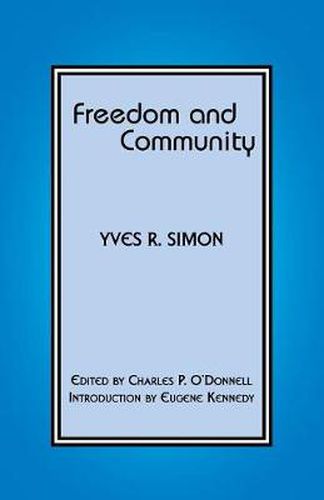Readings Newsletter
Become a Readings Member to make your shopping experience even easier.
Sign in or sign up for free!
You’re not far away from qualifying for FREE standard shipping within Australia
You’ve qualified for FREE standard shipping within Australia
The cart is loading…






When Professor Yves Simon came to the United States just before World War II, he had lived through the disturbing period in France when democratic government had foundered in feebleness and ineptitude; he had been appalled by the Ethiopian War and the violation of rational moral standards that, on that occasion, was condoned by European intellectuals and politicians. After his emigration to this country, he suffered because of the happenings in Nazi-occupied France. All of this deeply personal experience brought home to him the conviction that both unrestricted liberty and boundless authority are fictitious concepts. Each of them implies its own negation together with the annihilation of society…The essential question for every social group is that of combining rightly the forces of authority and liberty. The theory of liberty here propounded by Simon, along with his analysis of authority, democracy, and practical wisdom, contains the elements of a political philosophy that can provide direction to other contemporary political theorists of our times. While the latter have gathered great masses of political facts, they have lacked a normative set of ideas that can make these facts meaningful and useful to political society. Simon’s position as a philosopher rather than as a political scientist, is that while there is a science of social and political facts, a normative moral philosophy that knows the ends of human actions is necessary because people make good or bad use of their freedom. As always, Simon here writes with a lucidity and moderation that will be satisfying to reasonable people looking for a way out of skepticism and uncertainty. He was no dogmatist, but he knew what he knew and what he did not know. This is the beginning of wisdom and a model for philosophers.
$9.00 standard shipping within Australia
FREE standard shipping within Australia for orders over $100.00
Express & International shipping calculated at checkout
When Professor Yves Simon came to the United States just before World War II, he had lived through the disturbing period in France when democratic government had foundered in feebleness and ineptitude; he had been appalled by the Ethiopian War and the violation of rational moral standards that, on that occasion, was condoned by European intellectuals and politicians. After his emigration to this country, he suffered because of the happenings in Nazi-occupied France. All of this deeply personal experience brought home to him the conviction that both unrestricted liberty and boundless authority are fictitious concepts. Each of them implies its own negation together with the annihilation of society…The essential question for every social group is that of combining rightly the forces of authority and liberty. The theory of liberty here propounded by Simon, along with his analysis of authority, democracy, and practical wisdom, contains the elements of a political philosophy that can provide direction to other contemporary political theorists of our times. While the latter have gathered great masses of political facts, they have lacked a normative set of ideas that can make these facts meaningful and useful to political society. Simon’s position as a philosopher rather than as a political scientist, is that while there is a science of social and political facts, a normative moral philosophy that knows the ends of human actions is necessary because people make good or bad use of their freedom. As always, Simon here writes with a lucidity and moderation that will be satisfying to reasonable people looking for a way out of skepticism and uncertainty. He was no dogmatist, but he knew what he knew and what he did not know. This is the beginning of wisdom and a model for philosophers.